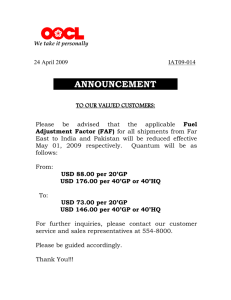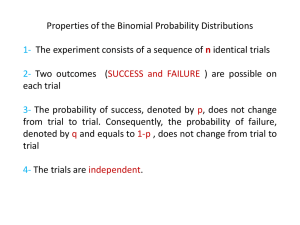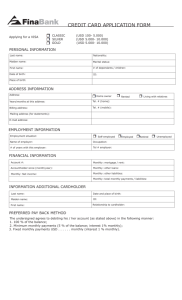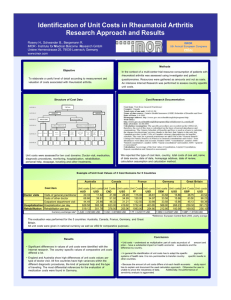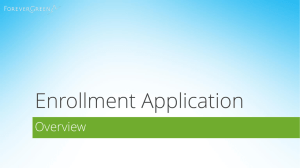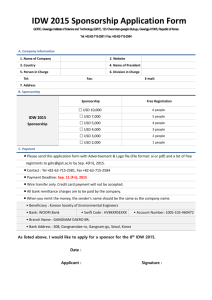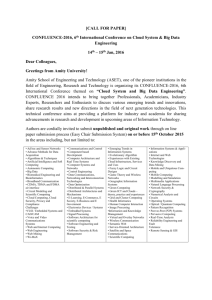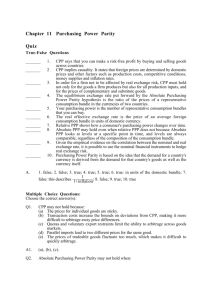Multiple Choice Questions - Indian Institute of Banking & Finance
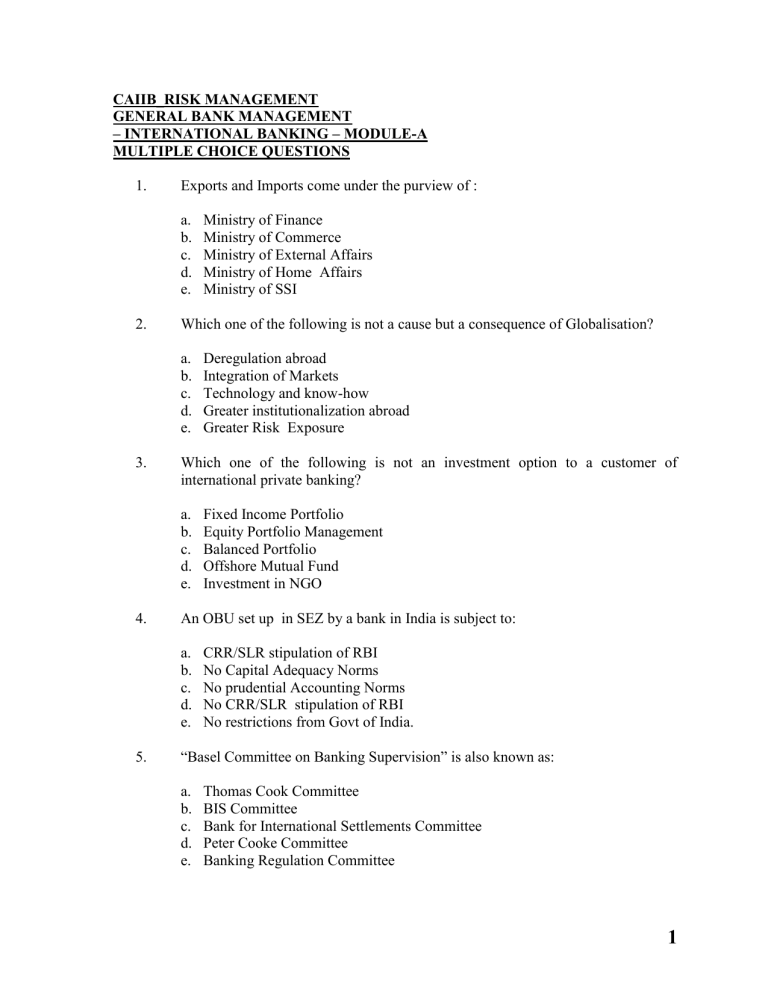
CAIIB_RISK MANAGEMENT
GENERAL BANK MANAGEMENT
– INTERNATIONAL BANKING – MODULE-A
MULTIPLE CHOICE QUESTIONS
1.
Exports and Imports come under the purview of : a.
Ministry of Finance b.
Ministry of Commerce c.
Ministry of External Affairs d.
Ministry of Home Affairs e.
Ministry of SSI
2.
Which one of the following is not a cause but a consequence of Globalisation? a.
Deregulation abroad b.
Integration of Markets c.
Technology and know-how d.
Greater institutionalization abroad e.
Greater Risk Exposure
3.
Which one of the following is not an investment option to a customer of international private banking? a.
Fixed Income Portfolio b.
Equity Portfolio Management c.
Balanced Portfolio d.
Offshore Mutual Fund e.
Investment in NGO
4.
An OBU set up in SEZ by a bank in India is subject to: a.
CRR/SLR stipulation of RBI b.
No Capital Adequacy Norms c.
No prudential Accounting Norms d.
No CRR/SLR stipulation of RBI e.
No restrictions from Govt of India.
5.
“Basel Committee on Banking Supervision” is also known as: a.
Thomas Cook Committee b.
BIS Committee c.
Bank for International Settlements Committee d.
Peter Cooke Committee e.
Banking Regulation Committee
1
6.
Which one of the following systems occurred first in the history of international banking? a.
Post Bretton Woods b.
European Monetary Union c.
Gold Standard d.
Gold Exchange Standard e.
Asian Clearing Union
7.
State Bank of India is maintaining account in Japanese Yen with American
Express Bank, Tokyo. It is known as: a.
Vostro account b.
Nostro account c.
Loro account d.
Escrow account e.
Current account
8.
Which one of the following is not an approved manner of payment for exports as per FEMA 1999 on Exports? a.
Bank Draft, pay order, bankers, cheque or personal cheques b.
FC Notes/F. T/Cs from the buyer during his visit to India c.
Payment out of funds held in the FCNR/NRE account maintained by the buyer d.
Precious metals i.e. Gold/Silver/Platinum by Gems & Jewellery Units in SEZs and 100% EOUs in equivalent value of jewellery exported subject to fulfillment of certain conditions. e.
Indian Rupees in cash
9.
If a country is having more exports than imports in value terms, it can be said that the country is having:- a.
Deficit under BOP b.
Deficit under BOT c.
Surplus under BOT d.
Surplus under BOP e.
BOP crisis
10.
Which one of the following is not a Current account transaction? a.
Imports payables b.
Exports receivables c.
Insurance d.
Dividend e.
External Commercial Borrowings
2
11.
Under a “TOM Value” transaction, the rate is agreed today but the settlement is to be done on: a.
Next working day b.
Same day c.
3 Working days after the date of deal d.
4 working days after the date of deal e.
2 working days after the date of deal
12.
An appreciation of the Rupee relative to the US Dollar would be expected to have which of the following effects? a.
Increase US exports to India b.
Increase US imports from India c.
Raise the cost to Americans for Indian imports d.
Create Balance of Payments surplus for India e.
Create Balance of payments surplus for USA
13.
Which one of the following is not a part of institutions under Bretton Woods
System? a.
IMF b.
IBRD( World Bank) c.
IFC d.
IDA e.
BIS
14.
Which one of the following is not a source of fund available to banks Preshipment Credit In Foreign Currency ( PCFC) Scheme? a.
EEFC A/cs b.
NRE A/cs c.
RFC A/cs d.
FCNR(B) A/cs e.
Escrow A/cs
15.
Unless other wise specified in a Letter of Credit which is issued subject to
UCPDC 500 and also UCPDC 600, documents must be presented for negotiation within ------ days from the date of shipment : a.
10 days b.
7 days c.
15 days d.
reasonable e.
21 days
3
16.
Banks trading actively in the forex market and offering a variety of products usually segregate their trading and dealing activities into three separate parts namely, (1)Settlement, Reconciliation and Accounting Section, (2)Dealing
Section and (3) Risk Management, Accounting Policies and MIS section which are also known as: a.
(1)Front Office (2) Back Office (3) Mid Office b.
(1) Mid Office (2) Back Office (3) Front Office c.
(1) Back Office (2) Mid Office (3) Front Office d.
(1) Front Office (2) Mid Office (3) Back Office e.
(1) Back Office (2) Front Office (3) Mid Office
17.
BEF is the statement which banks submit to RBI relating to :: a.
Transactions in US Dollars b.
Importers who have not submitted documentary evidence for import within stipulated time period c.
Over due export bills d.
Non performing assets e.
Excess overnight limit position of the bank
18.
As a dealer you are having a long position of USD 2 Mio in USD/INR @ 45.50.
The current market rate is 45.50/45.52. Your view of the market is that rupee will be appreciating. What should be your quote in this scenario? a.
45.50/45.51 b.
45.51/45.52 c.
45.50/45.52 d.
45.49/45.50 e.
45.4975/49.5075
19.
Tarapore Committee II has suggested Fuller Capital Account Convertibility of
Indian Rupee by the year ------------- in 3 different stages: a.
2009 b.
2010 c.
2007 d.
2008 e.
2011
20.
Tarapore Committee II has suggested in “Fuller Capital Account Convertibility
Report” that the present ceiling under Special Remittance scheme be enhanced from USD 25000/= or equivalent to: a.
USD 30,000 in Phase II and USD 100,000 in Phase III b.
USD 50,000 in Phase II and USD 100,000 in Phase III c.
USD 100,000 in Phase II and USD 200,000 in Phase III d.
USD 50,000 in Phase II and USD 150,000 in Phase III
4
e. USD 50,000 in Phase II and USD 75,000 in Phase III
21.
Which of the following is not true regarding an AWB? a.
It is prima facie evidence of receipt of cargo. b.
It is a document of title to goods. c.
The date of dispatch indicated on the AWB will be deemed to be the date of shipment d.
AWB serves as an instruction sheet giving all the instruction needed for moving the goods. e.
AWB is made out in three originals
22.
One month outright forward rate for GBP/INR is 80.81/80.83 and the relevant swap points are 10/9, then the outright spot rate for GBP/INR is: a.
80.71/80.74 b.
80.90/80.93 c.
80.91/80.93 d.
80.72/80.73 e.
80.91/80.92
NOV 2008
Prepared by R N Hirve, Chief Manager, International Division, Central Bank of India
5
